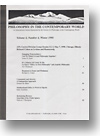|
apa central division group session g1-3, may 7, 1998, chicago, illinois: richard cohen on levinas and rosenzweig |
|
1.
|
Philosophy in the Contemporary World:
Volume >
4 >
Issue: 4
James B. Sauer
Engaging Transcendence:
Can We Think G-d and Philosophy Together?
view |
rights & permissions
| cited by
|
|
|
|
|
2.
|
Philosophy in the Contemporary World:
Volume >
4 >
Issue: 4
Stiv Fleishman
It’s (Almost) All Greek to Me:
Levinas’s “Ethics As First Philosophy” and Analytic Philosophy
view |
rights & permissions
| cited by
|
|
|
|
|
3.
|
Philosophy in the Contemporary World:
Volume >
4 >
Issue: 4
Richard A. Cohen
Responses to Fleishman and Sauer
view |
rights & permissions
| cited by
|
|
|
|
|
articles |
|
4.
|
Philosophy in the Contemporary World:
Volume >
4 >
Issue: 4
Donald M. Maier
Community and Alterity:
A Gadamerian Approach
abstract |
view |
rights & permissions
| cited by
In this paper, I ask how we, as linguistically constituted subjects, form communities that respect difference. Whatever “commonality” we find in our multicultural society cannot be grounded in a narrow concept of reason, a singular method of inquiry, or an a priori logic, but in language. By examining Hans-Georg Gadamer’s concept of linguisticality, we see that there can be a universal ground of meaning that will foster the formation of communities without recourse to the traditional foundations of thinking. Gadamer contends that language presents philosophy an infinite task that urges us to consider our fundamental linguisticality, the linguistic experience from which languages develop. By examining Augustine’s notion of the “innerword”, Gadamer explains our capacity to understand others, even when understanding seems least likely. Gadamer’s hermeneutics encourages us to understand the Other’s language. I conclude that a Gadamerian community allows us to understand each other without requiring that the Other become like us.
|
|
|
|
|
5.
|
Philosophy in the Contemporary World:
Volume >
4 >
Issue: 4
Eddy Souffrant
Multinational Ethics at Work in Nigeria
abstract |
view |
rights & permissions
| cited by
Cases of intervention in international affairs are often thought justifiable if the intervention is exercised against rogue political leaders and delinquent nation-states. The author offers an argument for the inclusion of an increasingly ubiquitous international agent, the profit generating corporation. This done, the paper argues that a cosmopolitan ethics of responsibility is an attractive mode of evaluation that renders corporations accountable in the international environment. This ethics of responsibility is applied to the particular case of British/Dutch Shell, Inc., in Nigeria to argue the merits of international intervention.
|
|
|
|
|
6.
|
Philosophy in the Contemporary World:
Volume >
4 >
Issue: 4
Patricia J. Thompson
Reclaiming Hermes:
Guardian of the Public Sphere
abstract |
view |
rights & permissions
| cited by
In an earlier paper, Hestia (R. Vesta)-guardian of the family hearthfire and center of household/family ritual activities in the ancient Greek oikos-was re-claimed as a metaphor for philosophical analysis of the private sphere in everyday life (SPCW, 1996). This paper undertakes a comparable project of reclamation for Hermes (R. Mercury), guardian of the public sphere of the ancient Greek polis and its later manifestations. The goal of this project of reclamation is not to introduce unnecessary neologisms or to support “New Age” spirituality. It is, rather, to help philosophers and social theorists to hold in mind two distinctive systems of human action within a singleexplanatory paradigm. Doing so allows us to compare and contrast in a consistent and coherent manner events, institutions, and actions in each of two systems operating in everyday life without privileging one (usually the polis and the political) over the other (theoikos and the familial). It is hoped that doing so may promote a dual standpoint theory that can take contemporary feminist theory (which seems to have painted itself into a corner) beyond gender.
|
|
|
|





